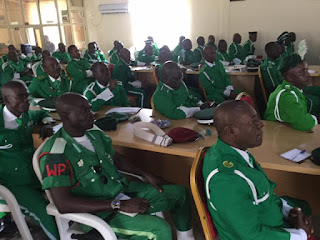THE FIRST FULANI EMIR OF ENUGU-By Hon. Femi Kehinde
*From Sokoto to Enugu: The Inspiring Story of Enugu's First Elected Mayor, Mallam Umaru Altine*
*Early Life and Background: Mallam Umaru Altine was born in Sifawa, a town in Sokoto Province, northe
rn Nigeria. He belonged to the Fulani ethnic group and was initially a cattle rearer.*
*He moved to Enugu, the capital of the Eastern Region, during the early 1950s and quickly integrated into the political and social life of the city. Enugu, at the time, was a melting pot of various ethnic groups due to its status as an administrative and industrial hub.*
Mallam Umaru Altine was a remarkable figure in Nigerian history, notable for his achievements as the first elected Mayor of Enugu Municipal Council, serving from 1952 to 1958. His story highlights a period in Nigeria's history when ethnic and regional boundaries were less pronounced in political leadership, as Altine, a Fulani man from Sokoto Province in northern Nigeria, rose to political prominence in the Eastern Region.
*Political Career*
*First Term (1952–1954):*
Despite being relatively new to Enugu,
In 1952, Mallam Umaru Altine contested and won the position of Mayor of Enugu Municipal Council under the platform of the National Council of Nigeria and the Cameroons (NCNC).
The NCNC, founded by Dr. Nnamdi Azikiwe, was a nationalist party advocating for Nigerian independence and had strong support in the Eastern Region.
Altine’s election as Mayor was a significant milestone, as he was not a native of the Eastern Region but was widely accepted due to his character, leadership skills, and dedication to public service.
His election represented a unique period in Nigeria’s history when ethnic and religious differences were less of a barrier to political leadership in diverse communities.
*Second Term (1954–1958):*
In the build-up to the elections for his second term, the NCNC pressured him to step down for another candidate, likely due to internal party dynamics. However, Altine refused and subsequently resigned from the NCNC.
Running as an independent candidate, he contested against the NCNC-backed candidate, D.T. Inyang, and won convincingly with 117 votes to Inyang’s 53.
Remarkably, in his ward, he was returned unopposed, demonstrating his popularity and strong grassroots support. His victory was a rare example of political independence triumphing over party politics during Nigeria’s pre-independence era.
*Personal Life and Integration*
Altine was married to Esther Ozueh, an Igbo woman, which further symbolized his integration into Eastern society. Their union was a reflection of Nigeria’s diversity and the potential for unity across ethnic and religious lines.
Despite being a Fulani Muslim from northern Nigeria, Altine was embraced by the people of Enugu, a predominantly Igbo Christian community, showcasing the cosmopolitan nature of the city at the time.
*Contributions as Mayor*
During his tenure, Altine contributed to the development of Enugu, particularly in urban planning, infrastructure, and public administration.
One of his most notable moments as Mayor was hosting Queen Elizabeth II during her royal visit to Nigeria in February 1956. He co-hosted the event with Dr. Nnamdi Azikiwe, then Premier of the Eastern Region. This visit placed Enugu on the map as a center of political and cultural significance in Nigeria.
Altine’s leadership style and contributions were widely respected, and his ability to bridge cultural and ethnic divides set an example for inclusive governance.
*Significance in Nigerian History*
*1. Symbol of Unity:*
Altine’s election as Mayor of Enugu is a landmark in Nigerian history, as it highlights a period when merit and leadership qualities were prioritized over ethnicity or religious affiliation in public office.
His success demonstrated that Nigerians could live, work, and lead across ethnic lines, a concept that became more challenging in the post-independence era due to rising regionalism and ethnic tensions.
*2. Political Independence:*
His decision to run as an independent candidate and win against a strong party-backed opponent exemplified his political resilience and the power of individual leadership in the face of party politics.
*3. Legacy of Inclusion:*
Altine’s story remains a testament to Nigeria’s potential for integration and inclusivity. He defied the odds to lead a city far from his home region, building trust and unity among diverse communities.
While Altine’s tenure as Mayor was marked by success, his political career also reflected the challenges of navigating party politics in Nigeria’s emerging democratic landscape.
*Historical Reflection and Lessons:*
Mallam Umaru Altine’s story stands out as a powerful example of what Nigeria could achieve with unity and cooperation across its diverse ethnic and cultural landscape. His life illustrates the possibilities of merit-based leadership in fostering inclusivity and progress, values that remain critical in modern Nigerian governance.
*Welcome to Enugu, the Coal City!!!*




Comments
Post a Comment